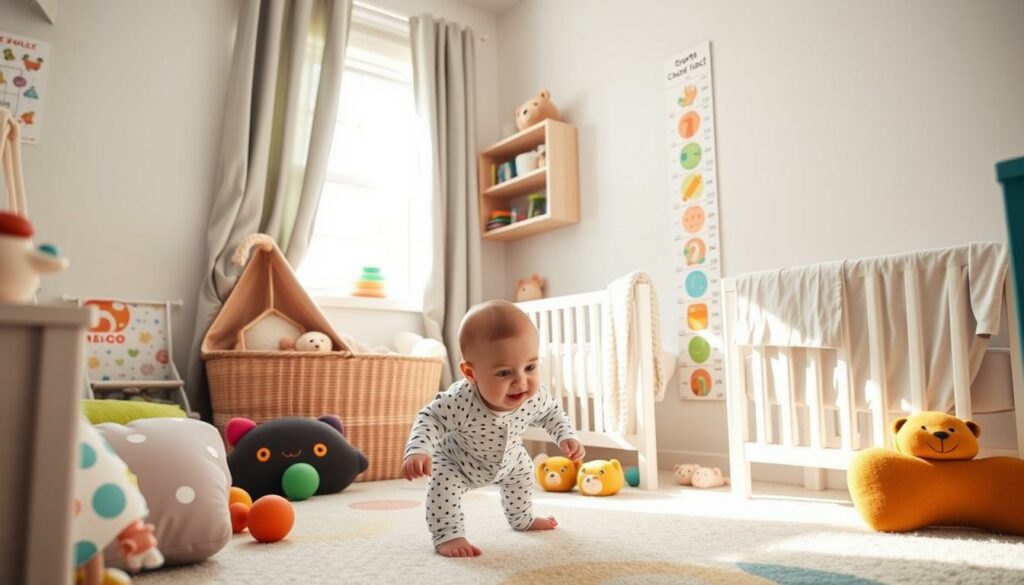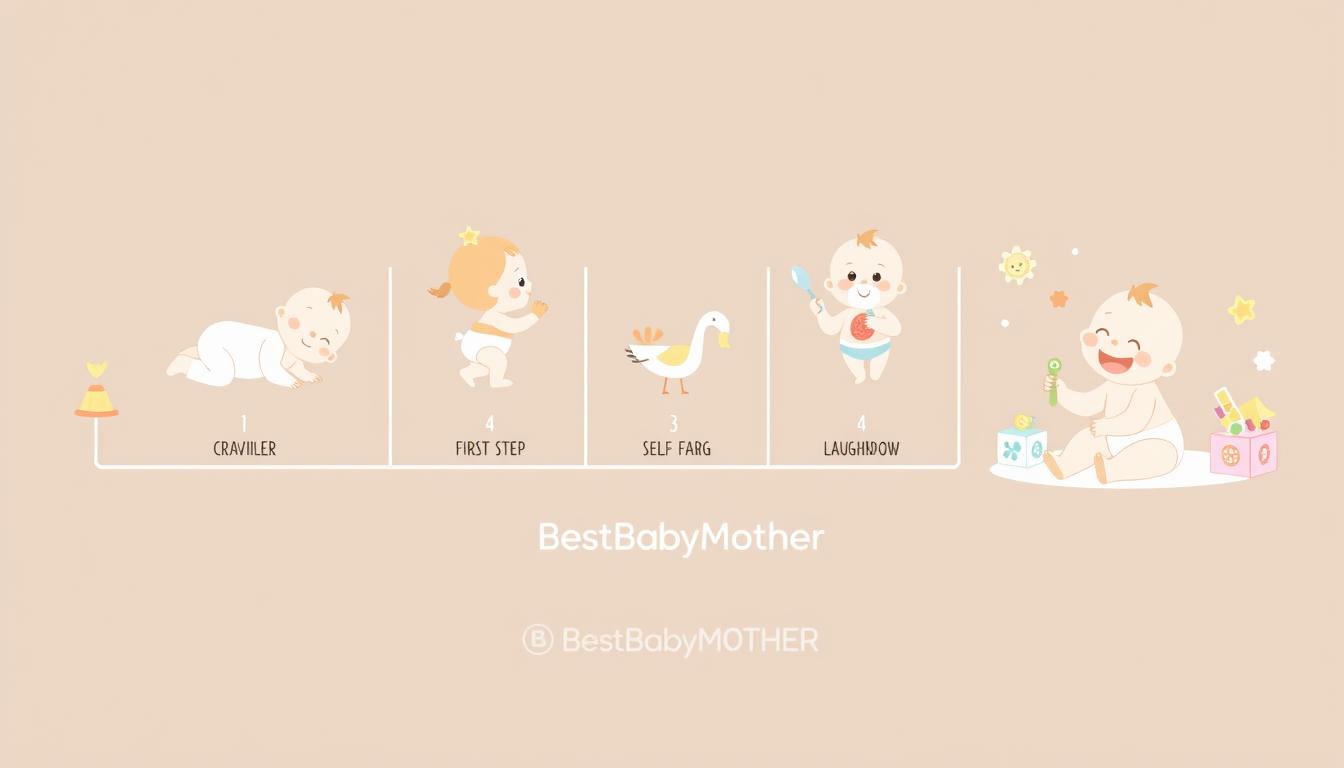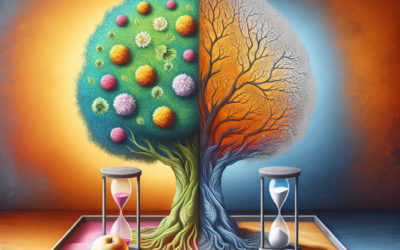How much can a newborn change in their first year of life? This question often leaves new parents both excited and a bit daunted. In just twelve short months, babies transform from tiny beings to curious explorers. This journey, filled with key newborn milestones, shows the incredible adaptability and growth of infants.
While every baby progresses at their own pace, knowing the typical baby development stages can help. Pediatricians, like Dr. Jennifer Shu, say these milestones should be seen as a dynamic process, not a strict checklist.
Key Takeaways
- Newborns typically start to focus on objects within 8 to 14 inches away by 1 month old, assisting in eye muscle and tracking skill development.
- At around 1 month, lifting their heads and showing genuine smiles are common milestones.
- By 2 months, babies begin cooing, have longer wakeful periods, and start experimenting with their hands.
- Laughing, babbling, and rolling over attempts are frequently seen in 3-month-old babies, marking early hand-eye coordination advancement.
- By 4 months, most babies can bear weight on their legs briefly and coo and laugh when spoken to, displaying increased playfulness.
- Many 6-month-old infants can turn toward sounds, imitate noises like blowing raspberries, and sit without support.
- By the end of 12 months, babies typically transition from crawling to standing, communicating their first words, and engaging actively in play.
Understanding Newborn Milestones
Tracking your baby’s growth is very important in early parenthood. These milestones show how your baby is doing as they grow. They are key signs of progress in newborns.
What Are Developmental Milestones?
Developmental milestones are skills or tasks babies do at certain ages. They cover five areas: moving, fine motor, talking, thinking, and social skills. Every baby grows at their own pace. Here’s a quick look at these areas in the first year.
| Age Range (Months) | Developmental Milestones |
|---|---|
| 0-3 | Begins to open and close hands, smiles at familiar faces, turns head towards sounds |
| 4-6 | Rolls from tummy to back, begins babbling, reaches and grasps for objects |
| 7-9 | Sits without support, responds to own name, plays peek-a-boo |
| 10-12 | Stands momentarily, says “mama” and “dada”, uses pincer grasp |
Importance of Monitoring Milestones
Watching your baby’s milestones is key to spotting any delays early. Doctors check for these during visits. This helps catch any issues early and helps your baby grow better.
The American Academy of Pediatrics suggests screenings at 9, 18, and 30 months. They also recommend extra checks for autism at 18 and 24 months.
Variations in Baby’s Development
Babies grow at different rates. Some might walk early, while others take longer. Some skip crawling and start walking right away.
Preemies might reach milestones later because they were born early. It’s important to remember that every baby is different.
First Month: Getting Acquainted with the World
In the first month, your newborn starts an exciting journey. They begin to discover the world, setting the stage for growth. This time is filled with big changes and important milestones.
Early Physical Developments
Newborns show many physical changes in their first month. They move suddenly, like kicking and stretching. They also try to touch their face with their hands.
Baby boys usually weigh about 9 pounds 15 ounces at one month. Girls weigh around 9 pounds 4 ounces. It’s important to feed them often, 8 to 12 times a day if nursing. Bottle-fed babies need 4 ounces every 3 to 4 hours.
Cognitive and Sensory Milestones
Your baby starts to see and hear the world in new ways this month. They focus on objects and faces, especially those with high contrast. They also start to recognize familiar voices, like their parents.
This growing sensory world helps your baby understand and interact with their surroundings. It’s a key time for early childhood development.
Emotional and Social Growth
Emotionally and socially, one-month-old babies start to form important bonds. They begin to smile when they see familiar faces. This is the start of their social skills.
Playing, talking, and cuddling with your baby helps them feel safe and loved. These actions are key for their emotional and social growth.
For more on newborn development in the first month, check out the development tracker.
The First Three Months: Rapid Changes
The first three months are full of fast changes in your baby. They grow in motor skills, social and emotional responses, and thinking. Infants make big steps in many areas, showing early signs of growth.
Motor Skills Progress
By three months, your baby’s motor skills will have improved a lot. They usually gain 1.5 to 2 pounds each month and grow an inch in height. You’ll see them lift their head and chest during tummy time.
Their head grows about 0.5 inches each month. This makes room for their brain to grow. By then, many babies will push down with their legs when their feet are on a firm surface.
Social and Emotional Responses
In the first three months, babies grow a lot in social and emotional areas. They start smiling at familiar voices, showing they know and care about their caregivers. They also start babbling and imitating sounds, showing their communication skills are growing.
Tracking Objects and Hand Movements
Cognitive development in the first three months is amazing. Babies start tracking objects with their eyes, helping them recognize people and things from afar. By three months, they should be able to reach and hold objects, moving them towards their mouths.
If your baby doesn’t notice their hands by two months or doesn’t react to loud sounds, it might be a sign of a problem. It’s important to make sure your baby reaches these milestones for their growth.
“If an infant doesn’t support their head well by three months or fails to grasp and hold objects, it might signal developmental concerns that should be addressed with a pediatrician.”
Knowing these early signs helps you meet your baby’s needs and get help if needed.
| Milestone | Age (Months) |
|---|---|
| Head raising and chest pushing during tummy time | 3 |
| Smiling at familiar voices | 3 |
| Babbling and sound imitation | 3 |
| Recognizing objects and people | 3 |
| Reaching for and grasping objects | 3 |
These early months are key for tracking your baby’s growth. They show important signs of health and progress. Keep an eye on these milestones to support your baby’s amazing growth journey.
Four to Six Months: Enhanced Interaction
As your baby grows between four and six months, you will notice big changes. They will get better at moving and talking. This stage is full of baby development stages that show their growing personality.

Rolling Over and Sitting Up
This crucial period is when your baby starts rolling over from tummy to back and back again. They might also sit up without help by six months. These skills help them move better and are important for their growth.
Begin Babbling and Laughing
Your baby’s talking and social skills get better at this time. They might say sounds like “ba” or “dee.” Their laughter shows they’re happy and trying to connect with the world. They also start to smile and make sounds back at you.
Introduction to Solid Foods
Introducing solid foods is a big step for your baby. Doctors say to start with iron-fortified cereals or pureed veggies and fruits. Watch how they react to new tastes and textures. It’s a key time for their eating habits.
Seven to Nine Months: Exploring the Environment
Babies from seven to nine months grow a lot. They can roll over and sit up by themselves. They might even start crawling.
Some babies can stand with help and take steps while holding onto furniture. They also get better at moving things with their hands.
They start to pick up items with their thumb and forefinger. Their communication skills grow too. They use sounds, gestures, and facial expressions to talk.
Babbling like “ba-ba-ba” and saying “mama” or “dada” is common. They also get scared of strangers and want to stay close to their parents.
Teething starts around this time. Babies drool more, chew on things, and feel uncomfortable. Giving them teethers or rubbing their gums helps.
It’s important to keep their environment safe. Make sure there are no hazards like sharp edges or small objects.
Talking, reading, and playing peek-a-boo help with their development. These activities improve their language skills and bond with them. If they miss milestones like making eye contact or sitting up, get help from a professional.
Here’s a table with key milestones for months seven to nine. These show how babies grow and develop during this time.
| Milestone | Description |
|---|---|
| Rolling Over | Ability to roll in both directions. |
| Sitting | Sitting without support and maintaining balance. |
| Crawling | Moving the body forward on the hands and knees. |
| Hand-Eye Coordination | Moving objects between hands and picking up items with thumb and forefinger. |
| Babbling | Creating sound chains like “ba-ba-ba” and simple words like “mama”, “dada”. |
| Teething | Increased drooling and chewing on objects. |
| Stranger Anxiety | Wary of unfamiliar faces and preferring parental proximity. |
Newborn Milestones: Ten to Twelve Months
As your baby gets closer to their first birthday, they reach many important milestones. Watching and helping them reach these milestones is key for their growth.
Standing and Cruising
Between ten to twelve months, many babies start walking on their own. They might stand with help and move along furniture. Make sure their environment is safe for these big steps.
By this time, babies should be able to sit up, roll over, and stand with support. They might even take their first steps.

First Words and Communication
Communication skills grow a lot during this time. They might say “mama” and “dada” more clearly. Most babies start to understand simple words and use gestures like pointing.
These skills show how important it is to talk and play with your baby often.
Engaging in Play
Playtime becomes more fun as babies start to play pretend and understand cause and effect. They can find hidden things, showing they know objects exist even when they can’t see them. Toys that encourage learning and play are great for their growth.
Learn more about supporting your baby’s growth during this exciting time here.
Keep an eye on your baby’s milestones and talk to doctors if you notice any delays. This includes crawling, standing, babbling, and other important skills.
Signs of Developmental Concerns
As your baby grows in their first year, watch for signs of developmental worries. Knowing when your child should hit certain infant development markers helps spot delays early. This early watch helps take the right steps for help.
What to Watch For
In the first months, babies change fast. By two months, they start moving, holding their head up, and smiling back. Before three months, they lift their head and chest while on their tummy and make eye contact.
But, if they miss these steps, it might mean they’re falling behind. Look for signs like:
- Not supporting their head by two months
- Failing to lift head and chest by the end of the third month
- Lack of eye contact by three months
- No response to smilings or social cues by two months
When to See a Doctor
If your baby misses many infant development markers or doesn’t seem to be getting better, listen to your gut. Dr. Jennifer Shu says to see a doctor if you think there’s a developmental concern. Catching and fixing delays early is key.
Parental Support and Encouragement
Creating a nurturing space for your baby is key. Your role as a parent is crucial. It helps in fostering curiosity and well-being. Here are ways to support your baby’s growth.
Creating a Stimulating Environment
Make your home safe and stimulating for your baby. Place toys within reach and talk to them often. This helps a lot.
According to the American Academy of Pediatrics, limit screen time for kids under 18 months. It’s good for their development. Also, be joyful and calm when you interact with your baby. It helps them feel supported.
Positive Reinforcement Techniques
Positive reinforcement is very helpful. Celebrate small wins, like their first babble. It boosts their confidence.
When babies notice things, smile and show excitement. It tells them their actions matter. This encourages them to keep exploring.
Supporting Your Baby’s Growth
Your support is vital from birth to toddlerhood. Comforting them when they need it builds trust. This is especially important in the first two months.
As they grow, introduce them to new things slowly. This helps them feel safe and curious. By 9 to 12 months, they start to recognize words. Engage with them and respect their choices. It boosts their confidence and strengthens your bond.
Being a supportive parent sets your baby up for success. It’s important to balance support with giving them independence. This helps them grow into a confident and well-rounded person.
FAQ
What Are Developmental Milestones?
Developmental milestones are skills babies grow up with. They include physical, thinking, feeling, and social skills. These skills happen in certain age ranges.
Why Is It Important to Monitor Milestones?
Watching milestones helps doctors see if babies are growing right. It helps find any delays early. This is key for helping a child grow well.
What Should I Do If My Baby Is Not Meeting Certain Milestones?
If your baby misses many milestones, talk to a doctor. Early help is very important for fixing any problems.
What Are Some Early Physical Developments in the First Month?
Newborns may move their hands to their face and jerk. These are early steps in learning about their bodies.
What Cognitive and Sensory Milestones Should I Expect Initially?
Newborns focus on faces and high-contrast patterns. They also know their parents’ voices. These skills help them learn and interact.
How Do Emotional and Social Growth Manifest in Infants?
Infants smile when they see familiar faces. These smiles show their emotional and social growth. They help with future interactions.
How Do Motor Skills Develop in the First Three Months?
By three months, babies can lift their heads and stretch. These skills show their growing strength and coordination.
What Social and Emotional Changes Occur in the First Three Months?
Babies smile at their parents’ voices and start babbling. These signs show their growing communication and bonding skills.
Why Is Tracking Objects and Hand Movements Important?
Watching objects and moving hands are key thinking skills. They are important for actions like grasping and reaching later.
What Milestones Can I Expect Between Four to Six Months?
Between four to six months, babies roll over, laugh, and get more interactive. They may start babbling and sit up with help.
How Significant Is the Introduction to Solid Foods?
Starting solid foods is a big step in a baby’s life. It happens around four to six months. It changes how they eat and grow.
What Are Typical Milestones for Babies Aged Seven to Nine Months?
At seven to nine months, babies start crawling, sitting alone, and know familiar words. These show they are getting more curious and mobile.
What Milestones Should I Watch for in the Ten to Twelve Months Period?
By ten to twelve months, babies stand with help, cruise, and may walk. They also start using simple gestures and say ‘mama’ and ‘dada’.
What Are the Signs of Potential Developmental Concerns?
Signs of trouble include missing milestones or not getting better. If you worry, talk to a doctor. They can help.
How Can I Create a Stimulating Environment for My Baby?
Make a safe, fun place for your baby to explore. Use toys they can handle, play together, and keep things safe.
What Are Some Effective Positive Reinforcement Techniques?
Praise your baby when they reach milestones or do good things. Smiles, claps, and kind words help them feel proud and confident.
How Can I Support My Baby’s Overall Growth?
Be involved in your baby’s growth by giving them different experiences. This helps with their physical, thinking, and feeling skills. Your support is key for their future.













